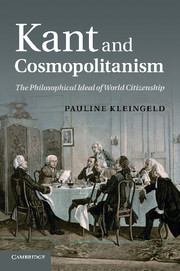Book contents
- Frontmatter
- Contents
- Acknowledgments
- Abbreviations and main primary texts
- Introduction
- Chapter 1 Kant and Wieland on moral cosmopolitanism and patriotism
- Chapter 2 Kant and Cloots on global peace
- Chapter 3 Kant’s concept of cosmopolitan right
- Chapter 4 Kant and Forster on race, culture, and cosmopolitanism
- Chapter 5 Kant and Hegewisch on the freedom of international trade
- Chapter 6 Kant and Novalis on the development of a cosmopolitan community
- Chapter 7 Kant’s cosmopolitanism and current philosophical debates
- Bibliography
- Index
- References
Chapter 6 - Kant and Novalis on the development of a cosmopolitan community
Published online by Cambridge University Press: 05 November 2011
- Frontmatter
- Contents
- Acknowledgments
- Abbreviations and main primary texts
- Introduction
- Chapter 1 Kant and Wieland on moral cosmopolitanism and patriotism
- Chapter 2 Kant and Cloots on global peace
- Chapter 3 Kant’s concept of cosmopolitan right
- Chapter 4 Kant and Forster on race, culture, and cosmopolitanism
- Chapter 5 Kant and Hegewisch on the freedom of international trade
- Chapter 6 Kant and Novalis on the development of a cosmopolitan community
- Chapter 7 Kant’s cosmopolitanism and current philosophical debates
- Bibliography
- Index
- References
Summary
Introduction
Cosmopolitan theories are often criticized for lacking a convincing account of the realizability of the cosmopolitan ideal. Critics assert that in order for this ideal to be realized, humans would need to develop felt attachments to humanity or humans in general, but that the world is too large and humanity too abstract for cosmopolitan attachments to develop. Therefore, they charge, the cosmopolitan ideal is destined to remain a pipe dream.
There are three ways to counter this line of criticism. One response is to admit that the development of the supporting psychological dispositions is unlikely, while insisting, heroically, that we ought to strive for the cosmopolitan ideal nevertheless, because its absolute impossibility cannot be proven. Alternatively, one can present an account of cosmopolitanism that is grounded in human sentiments, building its feasibility into the conception of cosmopolitanism itself, so to speak. Third, one can ground cosmopolitanism in something other than feeling but deny that the ideal is psychologically unlikely or impossible, by offering an account of the likely emergence of the sentiments required for ensuring the practicability of the cosmopolitan ideal.
- Type
- Chapter
- Information
- Kant and CosmopolitanismThe Philosophical Ideal of World Citizenship, pp. 149 - 176Publisher: Cambridge University PressPrint publication year: 2011

